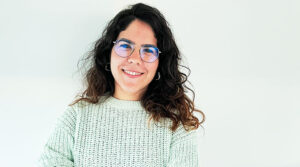We continue to meet our colleagues in 21st Century Women Technologists after the summer break. Getting to know their profiles, why they chose their careers, and the work they do at Grandiant can encourage and inspire other young women technologists to follow their path in technology. Listening to a young professor of Telecommunications Engineering talk about all that can be achieved with this knowledge was exactly what made our protagonist today, Adriana Febles Rodríguez, choose this career, which she studied in her native Cuba and later complemented with a Master’s degree in Research in Information and Communication Technologies at the University of Valladolid.
Adriana Febles works in the Advanced Communications area on several projects. On the one hand, some of these researches are developing solutions to reduce electrical energy consumption and make Industry 4.0 more efficient. On the other hand, he is also researching artificial intelligence models that aim to improve security in 5G networks. He divides his free time between sports activities, team building and dancing, or traveling to learn about the history, culture and nature of every corner he has the opportunity to visit.
What did you want to do when you were a child?
Growing up, like many kids, I thought about many careers as an adult. As a child, I spent summers with my grandparents in the countryside and I loved to ride horses. I remember that we often went to the rodeo and I used to say that I wanted to be like the horsewomen who participated in the various competitions. Then I wanted to be an actress, a dancer, a nurse, but what I kept the longest was that I wanted to be a psychologist.
Why did you choose technology?
At school I always liked math and physics, so I changed my mind about studying psychology. But I didn’t really have access to the context of technological careers. There was no Internet in Cuba, and technology was really behind the rest of the world. Nevertheless, every year the university opened its doors to students who were in their last year of high school. One day I attended this event, attended several lectures on different careers, and when it was the turn of the Telecommunications Engineering lecture given by a young professor, I was impressed with all that could be achieved through telecommunications. I decided that day that this was what I wanted to do.
Where did you decide on this career? And why?
In my country, students go to the university that corresponds to their place of residence, in my case it was CUJAE, Universidad Tecnológica de La Habana.
What are you currently working on?
Since I joined Gradiant, I have been working on projects in areas such as Industry 4.0 and Machine Vision, with the goal of studying the benefits of deploying artificial intelligence models on edge devices, specifically FPGAs. This solution allows to reduce the power consumption compared to other hardware platforms such as GPU. Currently, I am also working on the development of an Artificial Intelligence model aimed at improving the security of 5G networks by detecting the presence of attacks of different types in radio frequency signals.
What do you like most about your job?
What I like most about my job is the development phase of each project, because it is very dynamic and keeps you in a constant learning process. It also allows me to continue my professional development. Last but not least, the good working environment we have and the number of initiatives that are presented to get to know each other better while enjoying the wonders that Galicia has to offer.
Who is your female reference in the world of technology?
Unfortunately, I have never had a female reference in the world of technology, but I remember that when I was studying at university, a professor of digital electronics dedicated part of the class to telling us about some women who had left their mark on this world, and one of them was Hedy Lamarr, actress and inventor of the spread spectrum technique. That piqued my curiosity. Today, I am very interested in the stories of women like her who went unnoticed and did not get the recognition they deserved. Today, I have all of them as references, as well as many of my colleagues and friends who are doing incredible things and surpassing themselves every day.
How do you see the situation for women in your field?
Great strides have been made in recent years to promote the presence of women in technology careers, but I think there is still a psychological factor that has held us back in our efforts. In many countries, both developed and underdeveloped, girls grow up with the idea that certain careers are not for them or are unfeminine, and it is difficult to fight against these childhood traumas. So I think there is still a long way to go to end these prejudices that have been ingrained in society for so many years.
What would you say to the technologists of the future?
I would tell them that they are capable of achieving anything they set their minds to, that they should not be distracted, and that they should continue the legacy of so many generations of scientists, always for the benefit of society.



